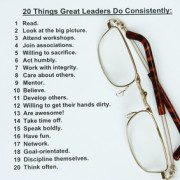Consistency: The Hobgoblin of Mediocre Practices
Consistency is one of the overlooked attributes of a successful practice. Consider these three examples:
1. Consistency in business development effort tends to yield strong results. Of course it’s important to do the right tasks and to do them in the most effective way. Your outcome is often measured, however, not by the brilliance of your plans but by the consistency of implementation.
Whether you’re establishing and growing relationships or using writing or speaking to develop your reputation, an isolated home run will deliver less benefit over time than solid base hits day in and day out.
Although several factors account for this, you can easily understand why consistency matters when you consider that studies show that it takes 7 to 9 (or as many as 13) exposures for your message to register with an observer. Imagine the difference in payoff if those 7 to 9 exposures occur in a space of a few weeks rather than a few months.
2. Consistency in client service makes happy clients.
If you and your team deliver knock-your-clients’-socks off service one day and merely competent service the next, they don’t know what to expect on the third contact. Chances are that adequate service will seem less than adequate since your clients know you’re capable of giving more.
A non-legal example, so you get the idea. A few years ago, a nail shop opened next to the gym I use. When I got the first manicure, I received the delightful hand and arm rub that’s standard for a manicure. Then the manicurist stood up, walked behind me, and rubbed my shoulder for two or three blissful minutes. I’d never had that happen before, and I was thrilled! About a week later, I went back. Same great manicurist, same great hand and arm rub, but nothing for the shoulders. I wasn’t as excited about going back for the third time (no shoulder rub), and I didn’t hurry back for the fourth visit. The tease of the great experience made the usual feel substandard.
Is occasional “wow” service undermining the value you usually deliver? Counteract that problem either by delivering amazing service day in and day out (the better route) or by identifying any special treat as something not to be expected on a routine basis. If you can wow them once, give thought to how you can do it over and over.
3. Consistency in your routine. When you develop a rhythm to your work, you prime yourself subconsciously.
For example, if you get in the habit of calling a few clients every Friday afternoon just to check in, update them on any developments in their matter, and see if there’s any way you might help them, after a few weeks you’ll probably find yourself taking time on Friday morning to mull over which clients to call. And if you miss those calls one Friday, once the habit is developed, you’ll notice that you feel a bit off, which will help you to pick up the phone on Monday instead.
When you create consistency in your routine, your schedule also becomes more routine and easier for your colleagues and staff. If you create a block of “interrupt for emergencies only” focused work time from 3 to 5 PM and let everyone know, they’ll come to time visits so that they avoid that block. On the flip side, if you announce that time block and then don’t honor it yourself, don’t expect anyone else to honor it either.
Consistency sometimes gets a bad rap as being dull. When you look more closely, though, you’ll see that offers substantial advantages when harnessed appropriately. How would you rate your consistency in these areas? Do you see other areas in which consistency would benefit you?




Leave a Reply
Want to join the discussion?Feel free to contribute!